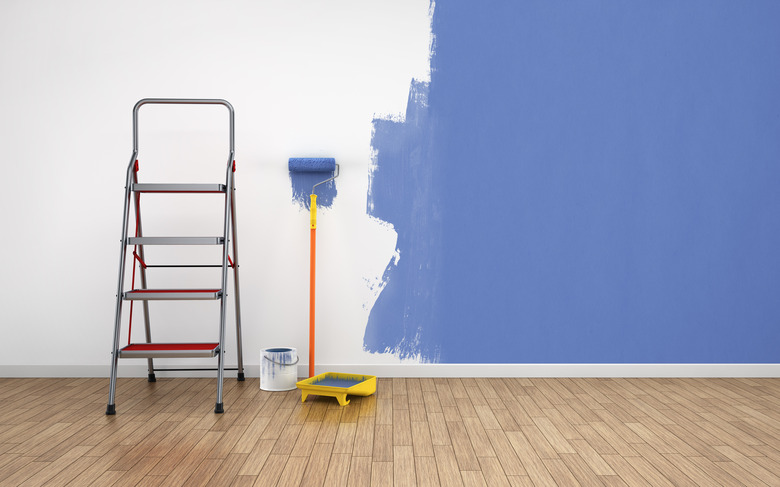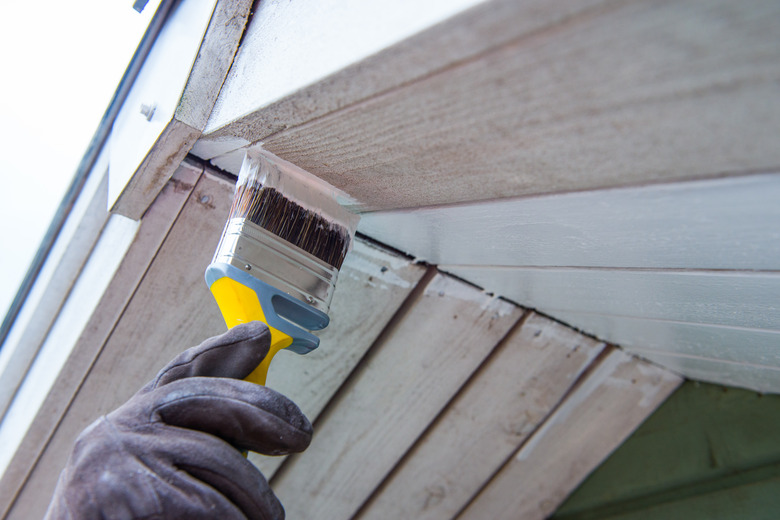What To Know Before You Hire A Painter
That old, white, two-story home might be your dream home on the inside, but the outside just looks drab and a little boring. A fresh paint job with a cheerful color is just what's needed to give your home a sunny disposition that matches your own, but painting it yourself is a bit more of a home improvement project than you'd like to tackle. Hiring a painter to do the job is a great way to upgrade the look of your home for an exterior or interior refresh, but you should do a little homework first to ensure you've chosen the right crew for the job.
What a Painter Does
What a Painter Does
Painters don't just paint homes; they also do all of the prep work needed and remove and apply caulk. They also do their best to ensure the paint sticks where it should and nowhere else, which might involve cleaning, sanding, and/or priming the project surfaces first. Every time painters scrape paint, they should also do their best to keep the chips contained and thoroughly clean up the mess. Some painting contractors specialize in artistic finishes, such as faux marbling or color washes (but don't assume every painter does this type of work).
While interior painters usually brush or roll the paint onto walls, some painters use sprayers when exterior painting. No matter what or where the paint job, a good painter uses a combination of tape, tarps, and drop cloths to protect surfaces that are not being painted. In some cases, they'll use extension ladders or scaffolding to reach high areas. Experienced painters generally have the ideal tools and techniques (and high-quality paint) to get the job done better and more efficiently than you could do on your own.
Doing Your Homework
Doing Your Homework
Before searching for the perfect house painter for your home's makeover, decide on a color and finish you'd like for the project area. For instance, bathroom walls benefit from a finish in the semigloss range to make the walls washable, but you probably won't want such a shiny finish on the ceiling. Choosing a new light color to go over the current dark or bright paint color may take more coats of paint than you'd expect, which means more labor time and more paint required, raising the project cost. If you live in a community with a homeowners' association, be sure the colors you're choosing for an exterior project fit within the HOA's rules; otherwise, it may expect you to change the color back to one it prefers.
For exterior painting services, the painters need room to extend ladders and possibly set up scaffolding. In any case, this may render part of your yard or driveway off limits while they're working, so plan to park elsewhere on their work days. For interior projects, make the painters' job easier by removing outlet and light switch cover plates, taping the screws to the backs of the covers with painters' tape so the screws don't get lost. Move furnishings away from walls or ideally out of the room before having the room's paint refreshed. While painters do their best not to get paint where it doesn't belong, mistakes happen. Also plan to keep pets and young children well away from the work areas on painting days.
The painters also need space to keep the paints, brushes, and tarps if the project takes more than one day, such as when painting a home exterior. Make space in the garage or some other out of the way area to store their supplies where they will be protected from weather. In some cases, this space may be in the room being painted.
Why Hire a Painter?
Why Hire a Painter?
While painting a bedroom's walls may be simple enough to DIY, especially if you enjoy painting, a larger or more complex paint job is best left to the pros. For instance, painting the exterior on the second story of a home gets a bit tricky, requiring ladders or even standing on a sloped roof to paint upper areas. Tall structures may require long extension ladders, which can be a bit unwieldy or even wobbly. Even indoor projects, such as repainting a ceiling over a stairwell, involve unusual ladder positioning that could be unsafe. These types of paint jobs are best left to pros familiar with the situations at hand.
Hiring a painter is also a good idea if you need to finish the job in a timely fashion. Painting an entire home exterior by yourself could take weeks if you only work a few hours per day, while a professional most likely has an entire crew that can quickly knock out such a job. A painter that's been in business for a while most likely does a better job than a DIYer thanks to years of experience. An experienced pro most likely knows which paints are the best for the job, how many coats are needed, and how long the paint should last.
Questions to Ask a Painter Before Hiring
Questions to Ask a Painter Before Hiring
Talk to several prospective painters to discuss not only the cost of the project but how each painter plans to tackle the tasks at hand.
1. How Will You Protect the Area?
Will you be scraping, removing chipped paint, patching holes, or even using drop cloths to protect the floor and furniture for an interior paint project?
2. What Prep Work Should I Do?
Ask if they'll clean the walls first or if they expect you to do it. For an exterior paint job, this information can be even more important if your home is from the 1970s or earlier, as there's a good chance that lead paint covers at least one of the layers. Lead paint requires extra care to prevent dust and paint chips, and some communities have specific regulations regarding lead paint removal or encapsulation.
3. What Tools Will You Be Using?
Ask which paints, primers, and tools they'll use to do the job, as the quality of the paints and the methods used to apply it can mean the difference between an acceptable job and an excellent one. Exterior finishes applied with a sprayer could result in overspray getting onto surfaces nearby, such as vehicles, other parts of the house, or even the neighbor's home, so it's good to know the painters' prevention plan if they choose this method. Reputable painters should have proof of liability insurance as well as a warranty for their work. This information should be clearly detailed in writing. Painters should also explain the project timeline, including which days the crew shows up and what time of day.
4. Do You Do Minor Repairs or Caulking?
Find out if the painters fill holes and replace crumbling caulk. Caulk needs to be repaired and replaced around windows from time to time anyway, so doing this while the house is painted saves you time or the expense of hiring someone else to do the job. Also ask for a breakdown of costs on the estimate showing materials and labor. Materials should be about 15 percent of the cost.
The Cost of Hiring a Painter
The Cost of Hiring a Painter
The cost of hiring a painter depends on the paint job itself and the local market. Even so, the quotes from several painters on a large job, such as painting an entire home exterior, may vary by thousands of dollars. Many painters charge based on estimated square footage of the project surfaces. Expect to pay $2 to $6 per square foot for typical paint projects, such as painting a room or a home exterior. Simple projects, such as interior walls, are at the low end of the price range at $2 to $4 per square foot. If the job requires painting difficult areas, such as a third floor exterior wall portion only accessible by standing on a steeply sloped roof, the price goes up.
Painting projects requiring multiple accent colors may also cost more, especially if that extra work involves scraping and repainting spindles or similar nonflat surfaces on porch railings, for instance. This is due to the difficulty and extra time needed to paint around curves and within narrow gaps between spindles compared to simply painting walls or window and door trim. Paint averages $25 to $50 per gallon, so compare the painters' material cost estimates with your own based on retail paint pricing for the same brand and type. Professional painters generally get a better price on paints than you could at a store.
Some painters charge by the hour or by the day, though this is less common than a square-footage price quote. Per-hour pricing ranges from $25 to $75 on average, while a per-day cost averages $200 to $500. For indoor wall murals and specialty paint finishes, expect to pay $50 to $100 per hour on average, or $25 to $35 per square foot. This price does not include cleaning and prepping the wall with a suitable base coat first, so ask the artist if he does this work. Otherwise, you may have to hire another to do so or simply do it yourself. Ask a specialty painter to break down his total costs. Make sure this includes his design fee for a mock-up if the project calls for him creating the design for the wall art.


